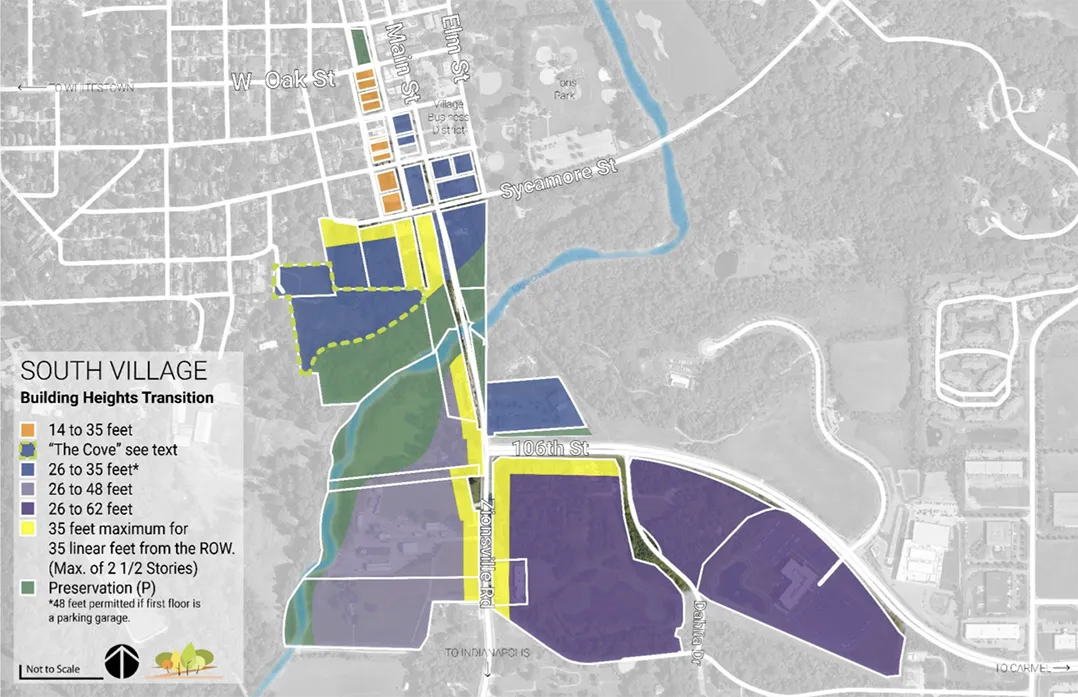Zionsville Mayor John Stehr has withdrawn the South Village planned unit development from Town Council consideration.
The PUD, which passed the plan commission with a favorable recommendation July 15, was scheduled for a vote Aug. 5 before the full town council. Stehr said that while the plans have been withdrawn, the town council is required by state law to give the proposal an up or down vote because it was approved by the plan commission. Stehr said he expects the council to deny the PUD.
“It will be procedural,” he said. “The (state) statute says we have to wait a year before we can come back with the same thing, but we can modify it and come back sooner. We can suspend the rules if that’s what we decide to do. I don’t think any of that is in the plans right now (but) I do think that we have a foundation that we can work from. We all worked really hard on this plan, so I think there are elements of it that we can use.”
In a letter to the town council, Sterh said there is not an appropriate consensus to move forward, but added that the South Village area is “key to preserving the culture and aesthetic of our iconic brick street. We must get it right.”
Redeveloping the South Village was a major campaign issue for the Stehr, who announced the proposal during a State of the Town meeting in March. Since that time, the mayor has hosted 35 informal public meetings to discuss the plan with the community.
“Like it or not, development is at our doorstep, and nearly 70 percent of the South Village district property is privately-owned,” Stehr wrote to the council. “We have urged these landowners to hold off on their projects until we could deliver a set of parameters in the form of a PUD document that represents a consensus around a vision for development in the area. Despite everyone’s best efforts, we have not been able to get there. I was hoping to achieve common ground upon which we could all stand, but it has become clear to me that a close vote (either way) is not a win for Zionsville.”
Stehr said landowners of properties in the proposed South Village PUD can now sell their land to developers who can work within the current zoning, which is different from what was proposed. On one parcel, for example, building height of up to 100 feet is permitted under the current zoning ordinances.
“The current zoning is not as restrictive as what we were trying to impose in the South Village PUD,” Stehr said. “(Property owners) can move forward under the current zoning, but there won’t be that extra layer of protection. All we wanted to do was take the current zoning that existed, tighten it down, add some more restrictions and put the town council in there as a buffer, as an extra layer that people would have to get through, particularly if they want to build apartments. That’s really all this was, it’s just a land use document.”
Stehr took responsibility for not being clear with people about potential developments of apartments, a key item opposed by those who spoke against the development.
“Part of communication is that people need to be willing to listen, too,” he said. “I think it was hard to make the case and I guess I didn’t do a very good job.”
Stehr added that positive change is possible in the South Village that can benefit everyone in Zionsville. He urged stakeholders to not delay action that will support economic development in the community. He added that residential development is a key factor in development of a successful South Village, and that apartments will likely need to have a place in any future development.
“I don’t know that the economics work without having people there,” he said. “You can build new restaurants, build new shops, build office space, but if there aren’t people in proximity to use those things, it doesn’t work. I know people are focused on apartments, but I think the economics would dictate that has to be a part of it.”
The PUD was created to set parameters for development of 110 acres between the brick Main Street and Old 106th Street, including standards for building heights, standards for setbacks, architectural standards and a land use that sets aside land for preservation. The proposal aimed to add dining, retail and commercial options to the Village, increase assessed property values and add people to the district.
The project has been the subject of mixed reviews by residents, with those in opposition particularly vocal ever since the mayor announced the PUD plan in March. A petition on change.org asking the town to halt the PUD process gained more than 400 signatures, arguing that the PUD puts the town “on a fast track to become a crowded, over-populated area and change the character of Zionsville forever.”
During a two-hour public comment period before the plan commission July 15, more than 20 residents spoke, with those in opposition citing the potential of overdevelopment and high-density residential options that could hurt the character of Zionsville. Other concerns raised included increased traffic, flooding and safety for pedestrians.
Stehr said he is disappointed by the outcome, but said it was the right move at this time.
“People have worked really hard and our town council has worked really hard. There’s been a lot of good collaboration on this,” he said. “It just got to a point where there was not enough common ground to move forward.”




